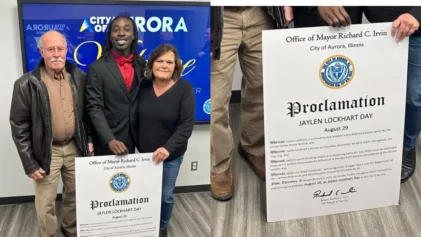Donors have flooded an online fund with more than $2 million to pay for the legal expenses of Daniel Penny, the man who’s accused of killing Jordan Neely after holding him in a chokehold on a New York City subway train car this month.
The law firm Raiser & Kenniff, P.C. launched the fund titled “Daniel Penny’s Legal Defense Fund” on the crowdfunding website GiveSendGo.

The description explains the fund’s cause, reading, “Daniel Penny is, a twenty-four-year-old college student and decorated Marine veteran, facing a criminal investigation stemming from him protecting individuals on an NYC subway train from an assailant who later died. Funds are being raised to pay Mr. Penny’s legal fees incurred from any criminal charges filed and any future civil lawsuits that may arise, as well as expenses related to his defense.”
By Monday morning, the fund had raised more than $2.04 million.
On May 1, Penny was caught on camera placing 30-year-old Jordan Neely, a Black homeless man who was reportedly mentally ill, in a chokehold on a subway train.
A video taken by a freelance journalist that went viral showed about three minutes of the encounter, but witnesses report Penny had his arm around Neely’s neck for 15 minutes. Neely lost consciousness and was later pronounced dead at a hospital. A medical examiner ruled his death a homicide.
Witnesses also say that Neely looked to be having a mental health episode when he boarded the train but didn’t pose a physical threat to anyone around him. He was crying out for food and something to drink.
Penny turned himself in last week and faces a second-degree manslaughter charge for the death of Neely. He was released on a $100,000 cash bond. His next court date is on July 17. He could face up to 15 years in prison if found guilty.
There are many different reactions floating around online to the news of the fund’s launch and the expeditious outpouring of monetary donations.
Penny’s attorneys released a statement last week saying that Neely “began aggressively threatening Daniel Penny and the other passengers” and that “Daniel, with the help of others, acted to protect themselves, until help arrived.”
When news of the incident started gaining traction, many people supported Penny because of his veteran status and the fact that he was one of the first people to swiftly take action to prevent subway riders from possibly being attacked by Neely, who has a criminal history.
In an interview with Military.com, another Marine veteran, Gabriel Murphy, publicly decried Penny’s actions. He started a petition to garner support for prosecution against Penny. More than 8,000 people have signed as of Monday morning.
Murphy, a former USMC infantryman and combat veteran, wrote in a description on the petition, “Based on the available video and descriptions, it appears that the individual who choked Mr. Neely chose to initiate a potentially lethal technique in a tense but nonviolent situation. It is probable that he received formal instruction on the technique including the fact that it was potentially lethal if held for more than several seconds. He chose to continue for several minutes, which caused the death of Mr. Neely.”
Other currently enlisted Marines and veterans echoed Murphy’s sentiments, stating that Penny’s actions do not align with the military training they received.
On a r/USMC Reddit board, one commenter said, “He knew or was liable for the knowledge that he could easily kill the man unless you think the Marines are a third-rate military. You can’t let him get away with it because it would lead to future vigilante havoc.”
Murphy also noted that Penny “knew, or should have known, that their actions would reasonably cause the death of Mr. Neely.” He goes on to say that the actions Penny took are not how he was trained and “do not meet the level of professionalism that is incumbent on servicemembers.”
“I hope that the military community joins me in disavowing the actions of this individual,” Murphy wrote.
The Department of Justice prohibited the use of chokeholds by federal law enforcement agencies because they have “too often led to tragedy.”


